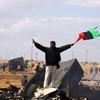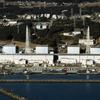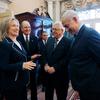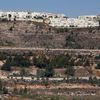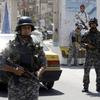David Sanger appears in the following:
WQXR's The Washington Report
Monday, March 21, 2011
NYT's David Sanger weighs in on the U.S. and European military operations in the skies over Libya and damaged nuclear reactors at the Japan's Fukushima power plant.
Washington Juggles Libya No-Fly Zone, Japan Crisis
Friday, March 18, 2011
Washington is facing two major foreign policy situations. The U.N. Security Council has voted to act broadly in Libya, imposing a no-fly zone and even leaving open other forms of conflict in order to protect the civilian population. With ten member states voting for the measure and five abstaining, it is an historic move in a complicated region. And in Japan, a dire nuclear threat continues while survivors of last weekend's earthquake and tsunami struggle to find food and shelter. How is Washington tackling these two situations?
WQXR's The Washington Report
Monday, March 14, 2011
NYT's David Sanger weighs in on the aftermath of the earthquake and tsunami in Japan.
Libya, Wisconsin, and Washington
Tuesday, March 01, 2011
Warships, no-fly-zones, and UN resolutions in the Middle East. Unions, collective bargaining and budget woes in the Mid-West. David Sanger, Chief Washington Correspondent for the New York Times, discusses what's on the Obama administation's mind today.
→ Read A Recap and Join the Conversation at It's A Free Country
The Military's Role in Political Change
Monday, February 21, 2011
As repressive regimes teeter and fall across the Middle East, the armed forces in these countries are in a consequential position. The Egyptian military quickly realized that President Mubarak’s hold on power was slipping. As protests erupted in Cairo, most of the armed forces refused to open fire on civilian protesters. However, the situation is radically different in Bahrain and Libya. What role are militaries playing in political change in the Middle East and elsewhere?
Egypt: Behind the Scenes
Monday, February 14, 2011
David Sanger is the chief Washington correspondent for The New York Times, files "The Washington Report" for WQXR, and is the author of The Inheritance: The World Obama Confronts and the Challenges to American Power. He joins us today to go behind the scenes of Egypt's regime change, and to explain the organization there and the U.S. response.
What's Next for US Foreign Policy as Mubarak Stays On?
Friday, February 11, 2011
Egyptian President Hosni Mubarak continues to hold power in Egypt after his announcement that he would not cede to demonstrators demands that he step down. Instead he decided to hand day-to-day powers to Vice President Omar Suleiman and made vague promises about the Egyptian Constitution.
President Obama watched Mubarak's speech on Air Force One, while returning from a trip to Michigan and seemed to be somewhat caught of guard. What role will the United States take now? A cautious one, says The New York Times, David Sanger.
The State of US-Egypt Relations
Wednesday, February 02, 2011
President Obama is treading delicately as tumult continues in Egypt. President Mubarak has been an ally of the United States for a long time, but the popular uprising has forced President Obama to come out in support of the protesters without being seen as meddling in the region.
Washington on North Africa & the Middle East
Monday, January 31, 2011
David Sanger, New York Times chief Washington correspondent and author of The Inheritance: The World Obama Confronts and the Challenges to American Power, looks at the Washington response to the pro-democracy movement in the Middle East.
→ Read More and Join the Conversation at It's A Free Country
Swiss Family Involved in Black Market Arms Deals
Friday, December 24, 2010
A Swiss magistrate has recommended that three members of a family in Switzerland be tried for violating their country’s laws regarding the use and proliferation of nuclear weapons. Magistrate Andreas Muller told The New York Times that a six-year investigation by Swiss authorities showed Friedrich Tinner and his sons, Marco and Urs, were working with Abdul Qadeer Khan, the so-called “father” of Pakistan’s nuclear bomb. The Tinner family had also, according to American officials, worked secretly with the C.I.A. on nuclear issues since 2000. If the Tinners are found guilty, they face up to ten years in prison. But what does their relationship reveal about a black market of nuclear proliferation at work in a country so friendly to the U.S.?
North Korea Nuclear Progress Greater Than Expected
Wednesday, December 15, 2010
North Korea seems to have surpassed Iran, in its efforts to develop the advanced technology that produces nuclear material and weapons. According to David Sanger, chief White House correspondent for our partner The New York Times, senior American officials were recently stunned to see that North Korea is far more advanced in its nuclear ambitions than anticipated. The officials visited a new plant at Yongbyon, where North Korea's main nuclear complex sits.
Wikileaks Documents Shed Light on US-Pakistani Relations
Wednesday, December 01, 2010
Among the State Department cables leaked on WikiLeaks and analyzed in The New York Times were messages from the U.S. Ambassador to Pakistan about the country's nuclear fuel resources. In a cable dating May 27, 2009, Amb. Anne W. Pateron reported her concern over a stockpile of highly enriched uranium, which had been sitting for years near an aging research nuclear reactor in Pakistan. There was enough to build several “dirty bombs” or, in skilled hands, possibly enough for an actual nuclear bomb.
The cables show that underneath public assurances lie deep clashes over strategic goals on issues like Pakistan’s support for the Afghan Taliban and tolerance of Al Qaida.
WikiLeaks Cables Reveal Iran's Nuclear Capacity
Monday, November 29, 2010
Secret diplomatic cables obtained by whistle-blower organization WikiLeaks shed new light on the global nuclear standoff with Iran. The documents reveal for the first time that the U.S. believes Iran has obtained nineteen powerful, Russian-designed missiles from North Korea. Their range is long enough to strike Western Europe. Will this change the way the country is seen and dealt with by its neighbors?
WQXR's The Washington Report
Monday, November 29, 2010
NYT's David Sanger discusses the 250,000 leaked diplomatic cables published by Wikileaks and analysed by the New York Times.
The Big Picture: Iraq and Afghanistan
Tuesday, October 12, 2010
On this week’s edition of The Big Picture, a look at why our military involvement in Iraq and Afghanistan has not been more of an issue on the campaign trail during this election season. David Sanger, Chief Washington Correspondent for the New York Times, explains what the official withdrawal of combat troops from Iraq and the increase in the number of troops in Afghanistan has meant for candidates and voters so far this year.
WQXR's The Washington Report
Monday, September 13, 2010
David Sanger joins Kerry Nolan to discuss why a Republican compromise on middle-class tax cuts is not a sign of rekindled bipartisanship in Washington.
WQXR's The Washington Report
Monday, September 06, 2010
David Sanger joins Kerry Nolan to discuss the August jobless numbers, new government stimulus proposals, and how the new round of Middle East peace talks are dealing with the key issues facing the conflict.
The President's Speech and America's Future Role in the Middle East
Wednesday, September 01, 2010
President Obama declared the end of combat operations in Iraq last night. David Sanger, chief Washington correspondent for The New York Times, analyzes President Obama's address from the Oval Office last night, and explains what it reveals about the future of the U.S. in the Middle East. Sanger says that Obama's speech was interesting for its message that the commitments in Iraq and Afghanistan are not open-ended, and that there are bigger priorities at home, including the economy and job creation.
WQXR's The Washington Report
Monday, August 30, 2010
David Sanger joins Kerry Nolan to discuss the upcoming middle east peace talks, as well as the Fed's announcement it will take additional steps to prevent a double-dip recession.
WQXR's The Washington Report
Monday, August 23, 2010
David Sanger, of The NYT, weighs in on U.S. combat troops pulling out of Iraq and why Pres. Obama is getting heat for going on vacation.
